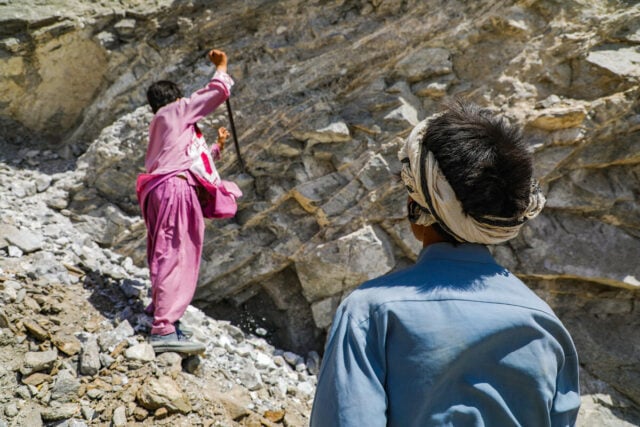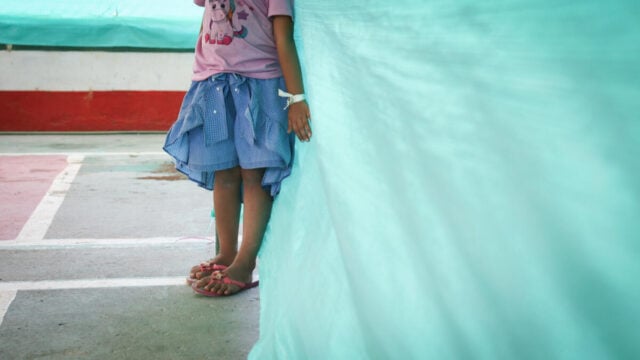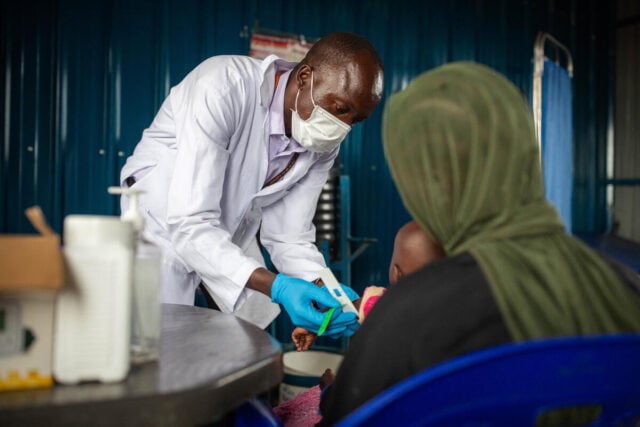An estimated 22,000 children lost one or both parents to Ebola during the 2014 West Africa outbreak. Ebola orphans and children recovering from the virus in Sierra Leone, the hardest-hit country by the virus, are being cared for and protected at government-run interim-care centers until they can be reunited with relatives or placed in foster care.
World Vision, along with other aid agencies, is supporting these interim care centers for orphaned and unaccompanied children, providing food, clothing, and refurbishing water and sanitation facilities. World Vision also trains local groups to conduct follow-up home visits to make sure vulnerable children are safely reintegrated into their community.
8-month-old baby girl will never know her parents
For now, 8-month-old Sie* (name changed to protect privacy) is quarantined in a care center for children in Sierra Leone’s Kono district. When she cries, her caregiver, Kamara, a 25-year-old Ebola survivor and mother of five, picks her up and hushes her tenderly. Though Sie stops crying, she doesn’t look at ease.
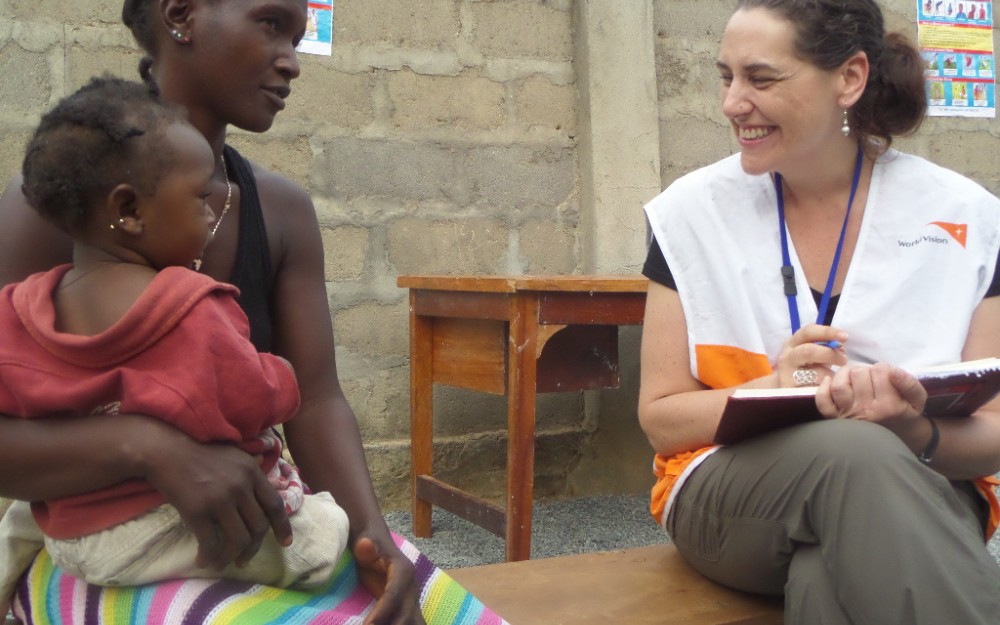
When Sie’s parents came down with Ebola, they were sent to a treatment center three hours away by ambulance. Sie was left behind. She is 1 of 16 children at the Kono district Observational Interim Care Center, which can accommodate up to 20. Some of the children can hope to return home after completing 21 days in quarantine. Ultimately, the aim is to reunite the children with surviving family members or find foster homes in their communities.
Like Kamara, the nine staff members at the children’s care center are Ebola survivors and all are believed to be immune to the disease. They battled the virus and won, then came back for another round. They not only provide hands-on care for boys and girls who could be infected, but they also do the cooking and cleaning and still find time to play with the children.The bright, clean and well-run center, supported by World Vision, UNICEF, and other organizations, complies with Ebola infection prevention measures.
The bright, clean and well-run center, supported by World Vision, UNICEF, and other organizations, complies with Ebola infection prevention measures. There’s a temperature check and hand-washing station at the entrance. Floors and bathroom are disinfected several times a day.
World Vision provides food for children and staff, as well as bedding, clothes, and shoes. We supplied furniture, cooking equipment, and a power generator as well.
But for all the material and physical support that is provided, the children face even more daunting emotional challenges.
Over the next three months, World Vision will train care center staff in activities to provide psychosocial support for the children. In Pujehun district, recently declared Ebola-free, a care center is being established for Ebola orphans who need support and protection. World Vision will train staff there too.
What does the future hold for a 3-year-old Ebola orphan?
Ebola came into 3-year-old Samuel’s life more than six months ago, bringing sickness and loss.
Samuel’s adored father, Samuel Batty Sr., was a senior community health worker at Connaught Hospital in Freetown, Sierra Leone, where he contracted the virus from a patient. Samuel Batty Sr. was studying medicine under the supervision of renowned Sierra Leonean surgeon Dr. Martin Saliah, who also died of Ebola in November 2014. Samuel Sr. had a promising career ahead.
When he fell ill, Samuel Sr. traveled to Bo, his hometown, where he developed a fever. Laboratory test results showed that he was Ebola positive. He was admitted to the Bandajuma treatment center and died there Dec. 2, 2014.
Soon afterward, Samuel Jr. showed signs of the disease and was rushed to the hospital. He tested positive for Ebola, as did his mother, Musu. She died 10 days after her husband.
None of the family’s other four older children succumbed to the disease.
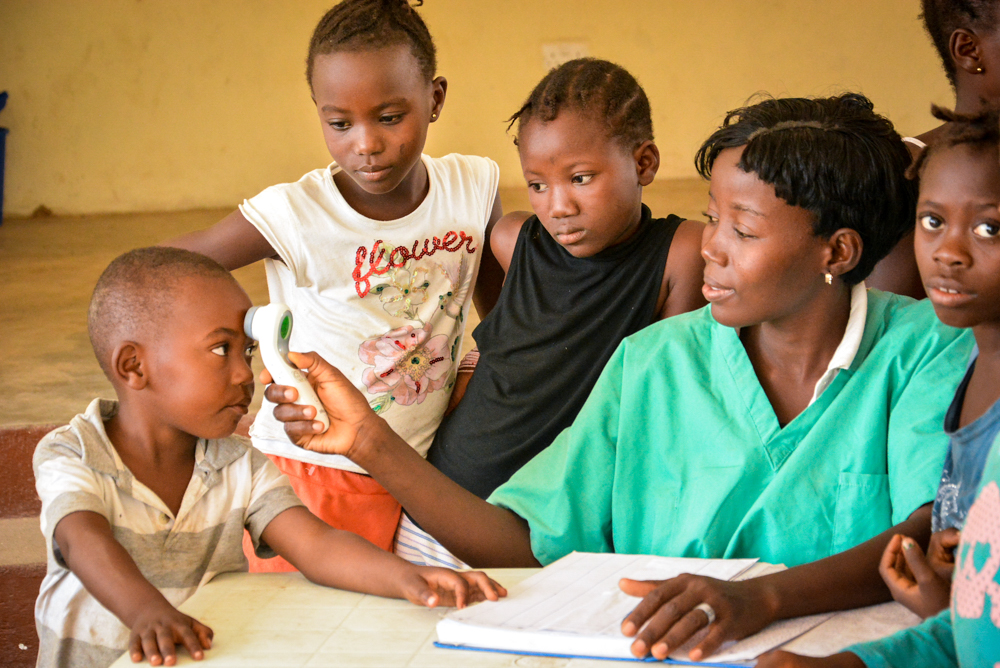
Samuel Jr. still misses his father, but he has found a friend in nurse Alima Koroma, 29, a young mother who is also an Ebola survivor. As a survivor of the disease, Alima is immune to Ebola.
“I was working at a clinic where I contracted the disease from a patient. The entire hospital was quarantined shortly after her death,” says Alima. “A few days later, I had a fever and tested positive for Ebola. My colleagues were afraid to tell me for fear that [the virus] might knock me out completely, since I am sickly by nature. They told my elder brother instead.’’
Alima and Samuel are inseparable. “I am so fond of him,” she says. “He has lost both parents, and it is not easy for a child his age.”
Alima says that Samuel and the 28 other children at the center sometimes show signs of stress. “Samuel is sometimes naughty, and he cries a lot and talks about going to see his parents,” she says. “But I am here to encourage him.”
In addition to the children’s psychosocial needs, Alima is also concerned about the health complications that some Ebola survivors are experiencing. “Some people go blind, some fall ill. Because of poor medical attention, some even die,’’ she says.
Samuel also has a best friend among the children in the center, 4-year-old Bernard Forray. Both boys are Ebola survivors. Bernard also lost his father, although his mother survived. Bernard will soon be reunited with her.
When it is time for Samuel to leave the center, he may be placed with his aunt, Betty Batty, and her husband, Samuel Sr.’s older brother.
“I would gladly embrace the idea of Samuel staying with me. He has nowhere to go; he is my son now,” Betty says. “Even before his parents’ death, I was so fond of him. I will do my best to keep him happy.”
Samuel Batty Jr. is fortunate to be surrounded by the loving care of adults. With time will come the hard knowledge — his parents aren’t coming back to get him.
‘I kept praying to God, and he saved me’
Within less than a month, Ebola robbed 12-year-old Aminata of her closest family members.
“The ambulance came for my mother, and she did not return,” she says. “It came for my father; and my elder sister followed. None of them came back. I didn’t even get to see where they were buried.”
Soon after her family members died, Aminata came down with tonsillitis, fever, and joint pains. Then the ambulance came for her.
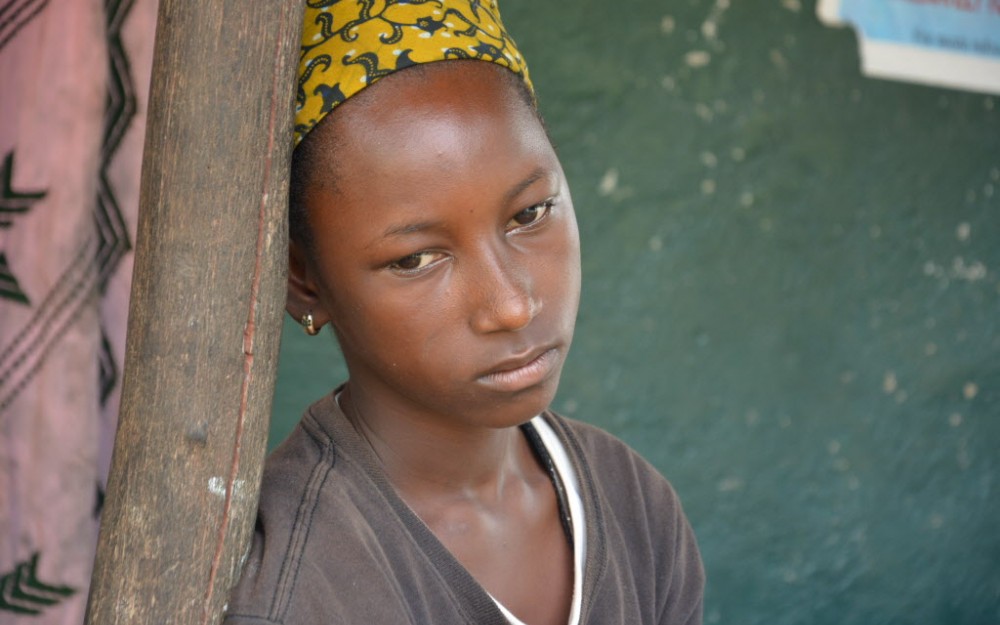
“I told them [health workers] my own case will be different because Jesus will not fail me,” she says. “I had in my hand a Bible given to me by World Vision. I kept praying to God, and he saved me.”
After six days in an isolation center, Aminata got the good news that her blood sample showed no signs of Ebola.
“When they told me I did not have Ebola, I was so happy,” she says. “I am not happy living without my parents, but I thank God I am alive and free from Ebola.”
Aminata is fortunate to be able to live with members of her extended family in the Bo district of eastern Sierra Leone. In early October, UNICEF estimated that 3,700 children in Liberia, Guinea, and Sierra Leone had lost one or both parents to Ebola. Family members sometimes reject Ebola orphans out of fear.
Aminata participates in sponsorship programs supported by World Vision donors in Hong Kong. World Vision staff have provided food and hygiene support for her family, and they checked to ensure Aminata is cared for and protected.
“World Vision has done a lot for me and my family,” Aminata says.
A secondary school student, she said school was the best part of her day. But now schools are closed to prevent the spread of Ebola.
“Ebola, poverty, and thoughts about being a dropout are some of the challenges I am facing,” she says, acknowledging the realities of life ahead without her parents.
Contributors: Sahr Ngaujah and Alison Schafer, World Vision staff.
